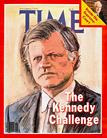
Senator John McCain, Arizona
America's
Those who do, and don't, make a difference in the U.S. Senate
|
The skills that allow McCain to put unorthodox issues at center stage—independence, single-mindedness—don't always translate well to other pursuits. They helped McCain lose the 2000 G.O.P. presidential primary by scaring the party establishment and its base. So as the front runner in the 2008 campaign, McCain is taking the opposite tack, endorsing Bush tax cuts that he once opposed as fiscally unsound; embracing religious conservatives like Jerry Falwell, whom he once denounced; and endorsing the teaching of intelligent design as an alternative to evolution. Opinion writers have been perplexed at the preprimary turnaround, but the two-year walk-up to 2008 won't just consist of courting the party's die-hards. McCain is scheduled to assume the chairmanship of the powerful Senate Armed Services Committee next January, a target-rich environment for a waste and fraud hunter. He is already stumping against gerrymandering, which he says is undemocratic. "It's harder to keep your job in the politburo in Havana than in the House of Representatives," McCain says.
And if he wins in 2008? Among the first items on his agenda in 2009, McCain says, is winning the battle that George W. Bush just lost—fixing Social Security and other underfunded entitlements. Crucial to that effort, he says, is getting Congress to clean house. "If you've got $47 billion in earmarks and 6,140 pork-barrel projects on the highway bill, how can you expect the American people to make tough decisions about entitlement programs?" he asks. No matter what happens in '08, says scholar Norman Ornstein, McCain will be remembered as "one of the few people who can have great impact in the Senate."

